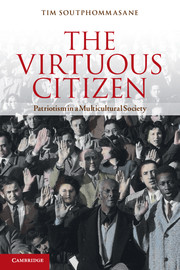8 - Immigration and integration
Published online by Cambridge University Press: 05 November 2012
Summary
Future citizens of a political community emerge from one of two sources. The first I dealt with in the previous chapter: the children of current citizens who, in due course, become citizens in their own right. The second source of citizens forms the subject of this chapter: the immigrants who enter a country to settle and start a new life. If a political community integrates children into its public culture through civic education, how must it integrate immigrants? From a liberal nationalist perspective, policies relating to immigration should be determined, at least in part, by considerations about how best to maintain a national identity and culture. The underlying principle should be one of national self-determination. A liberal state has a legitimate interest in ensuring its institutions and practices are expressions of the culture of a particular national community.
A self-determining political community will decide the number and complexion of immigrants a state will admit into its territory; how it seeks to acculturate immigrants and accommodate diverse identities; and how it manages the process of naturalisation for immigrants who seek to adopt formal citizenship. But there are two levels at which immigrants are admitted into a political community and at which normative questions emerge. The first concerns the level of initial admission into a community's territory: that is, the decisions a state makes about the number and composition of immigrants it will admit. If the state is in a position to let some people into its territory but keep others out, on what basis can it discriminate? The second relates to the subsequent level of admission: settlement and membership of a national political community. Once immigrants are allowed to settle in a given society, how should the state go about ensuring that immigrants can become full and equal participants in the life of the community?
Information
- Type
- Chapter
- Information
- The Virtuous CitizenPatriotism in a Multicultural Society, pp. 195 - 228Publisher: Cambridge University PressPrint publication year: 2012
